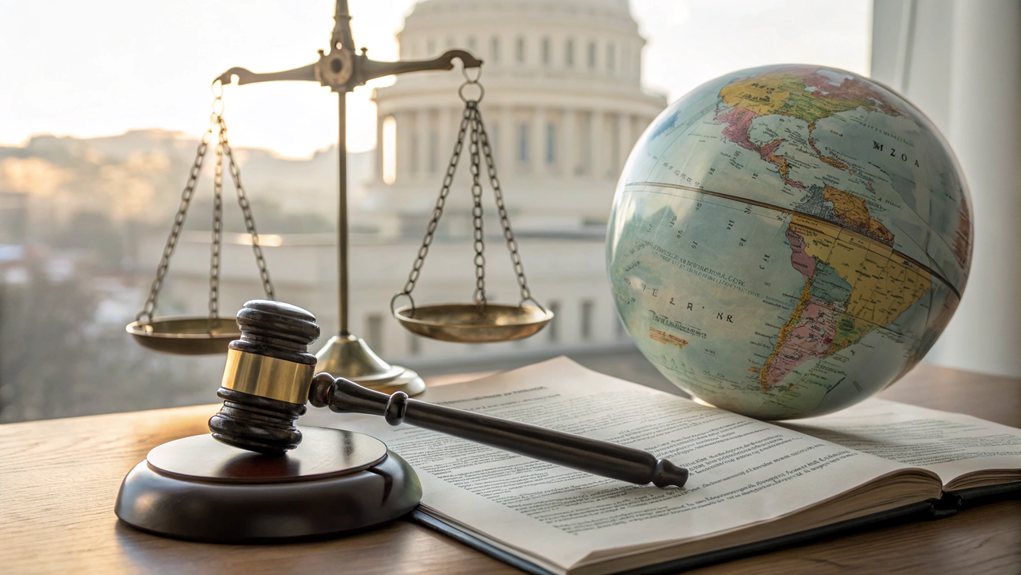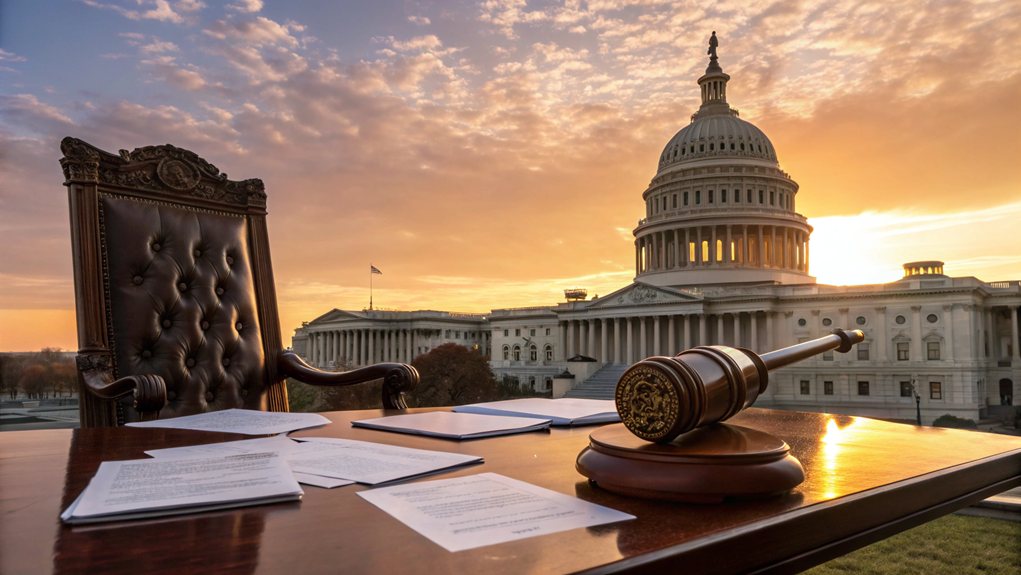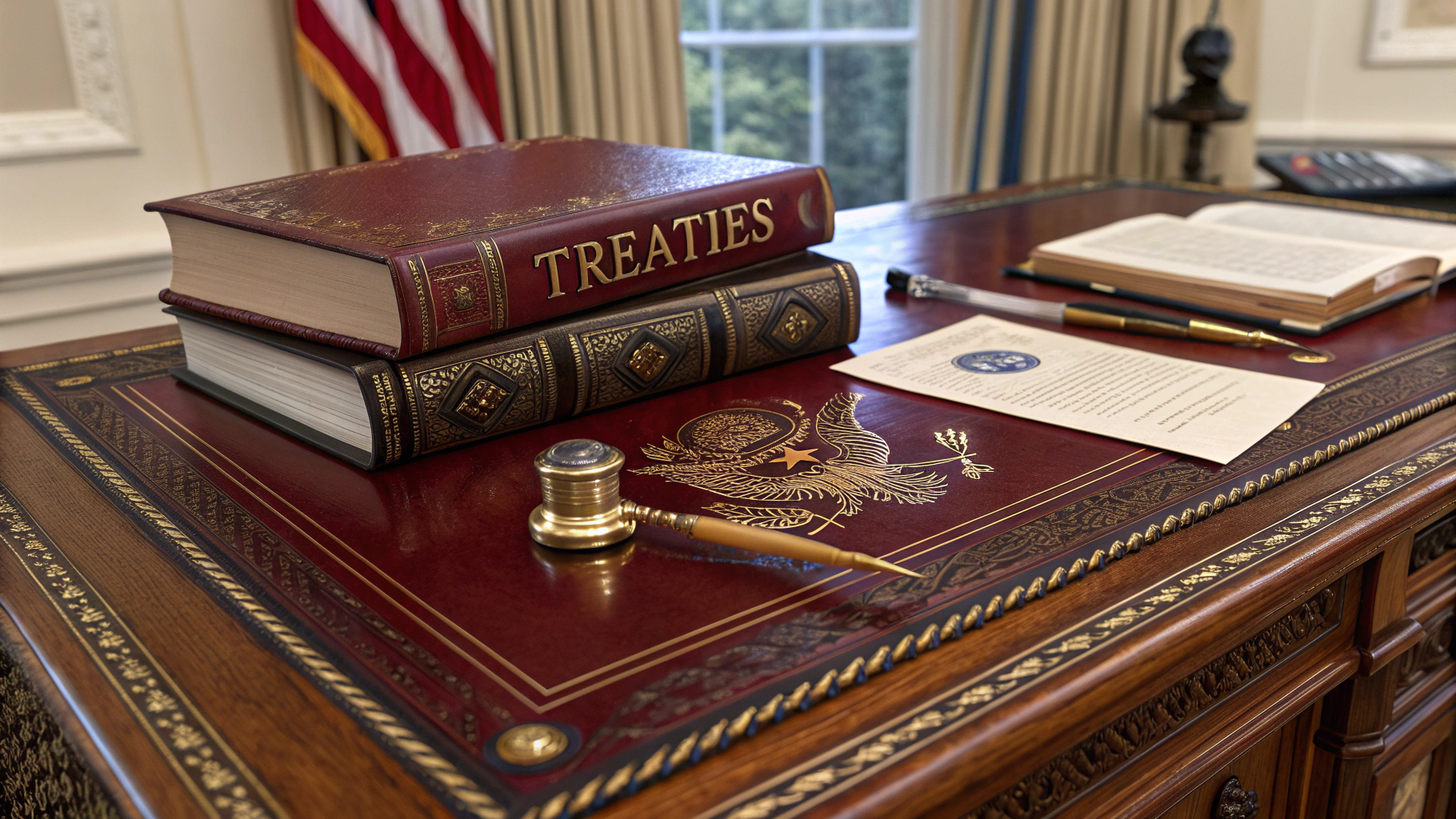International treaties can flip a country's legal system upside down. They often require domestic laws to change or adapt, like an uninvited guest messing with the furniture. Some countries fold treaties right into their laws, while others need a whole legislative process. To summarize, treaties can dictate everything from trade rules to human rights, forcing nations to comply or face the consequences. Curious about how this all plays out? There's more to unpack.

When it comes to international treaties, one might think they only matter on the global stage. But that's where the confusion begins. These treaties don't just hang out in diplomatic circles; they seep into domestic law, sometimes with a splash and sometimes with a whimper. Countries sign and ratify treaties, pledging to follow through. But guess what? That can mess with their sovereignty. It's like agreeing to a roommate's weird rules—now you're stuck with them.
The way treaties make their way into domestic law varies. In monist countries, they just slide right in, no questions asked. It's like a VIP pass. In dualist countries, they need a ticket—legislative approval—to get in. So, either you're all aboard, or you have to jump through legislative hoops. And let's not forget constitutional rules; they can throw a wrench in the works too. In the U.S., for example, the treaty ratification process requires a two-thirds approval from the Senate, adding a layer of complexity to how treaties become part of domestic law.
Treaties have different entry strategies: monist countries welcome them instantly, while dualist ones require legislative approval.
Now, what about the legal effects? Treaties can have direct effects. This means courts can enforce them straight away. Others? They hang around but need a nudge from local laws. Courts play the significant role of deciphering these treaties. They're like the interpreters at a diplomatic meeting, making sense of the fine print. Furthermore, some treaties impose express legislative requirements for compliance, emphasizing the necessity of domestic legal frameworks for enforcement.
In fact, treaties related to human rights protections often compel states to adjust their laws to align with international standards, ensuring that domestic law reflects the principles agreed upon.
Then there's enforcement. The principle of "pacta sunt servanda" says treaties must be performed in good faith. Sounds nice, right? But it's the states that are supposed to enforce them domestically. And if they don't? Well, there are international mechanisms for that, but good luck steering through those waters.
Finally, the impact on domestic policy can be huge. We're talking about regulations on trade, environment, and even human rights. These treaties can reshape laws and influence societal norms. So yeah, international treaties might seem like a distant issue, but they have a way of crashing the party right at home.
Frequently Asked Questions
What Examples Exist of Treaties Changing Specific Domestic Laws?
Treaties have a knack for shaking things up domestically.
Take the Genocide Convention; countries had to scramble and create laws to criminalize genocide.
Then there's the UN Convention against Torture, forcing nations to outlaw torture like it's a bad habit.
The Paris Agreement? Well, that pushed many to tweak environmental laws.
So, yeah, treaties can flip the script on local laws faster than you can say "international obligations."
Who knew diplomacy could be so impactful?
How Do Countries Prioritize Conflicting Treaties and Domestic Laws?
Countries juggle conflicting treaties and domestic laws like a circus act.
Some nations have a monistic approach, where treaties slide right into domestic law—no fuss.
Others? They need a legislative nod, which can get messy.
Courts often step in, trying to untangle the mess. They apply principles like pacta sunt servanda, because who doesn't love a good legal principle?
In the end, it's all about keeping up with international obligations—no pressure, right?
Can Citizens Challenge Domestic Laws Derived From Treaties?
Citizens can indeed challenge domestic laws that stem from treaties.
It's not a walk in the park, but it's possible. They can file lawsuits, claiming those laws violate treaty provisions. Courts then get to decide if the law stands or falls.
Sometimes, judges can even slap down government actions that clash with treaty obligations.
It's a messy dance of legal wrangling, but hey, someone's got to keep the government in check, right?
What Role Do Courts Play in Treaty Implementation?
Courts have a messy job when it comes to implementing treaties. They decide if a treaty can just jump into action or if it needs Congress to hold its hand first.
Sometimes, they play the political question card, dodging sticky foreign policy issues.
And let's not forget the Supremacy Clause, which insists treaties are the law of the land.
It's complicated, and not everyone is happy about it. But that's the legal game.
How Do Treaties Affect State Versus Federal Law Dynamics?
Treaties can really shake things up between state and federal law. To sum it up, federal law wins.
States might not get a say, even if they don't like it. It's like a power struggle, where treaties can stomp all over state laws without breaking a sweat.
Courts get involved, too, interpreting these treaties and keeping things interesting. So, yeah, treaties can pull the rug out from under state authority. Fun times!










1 comment
Comments are closed.